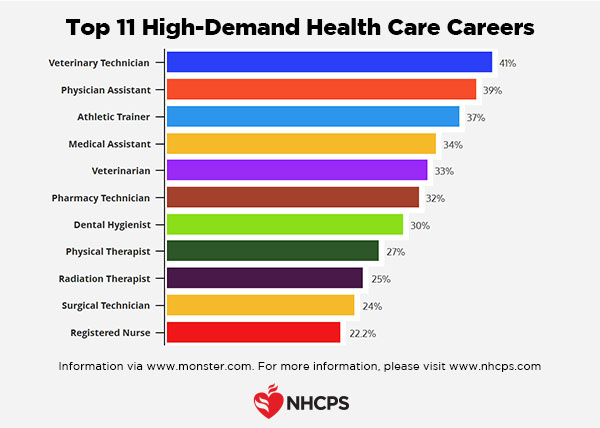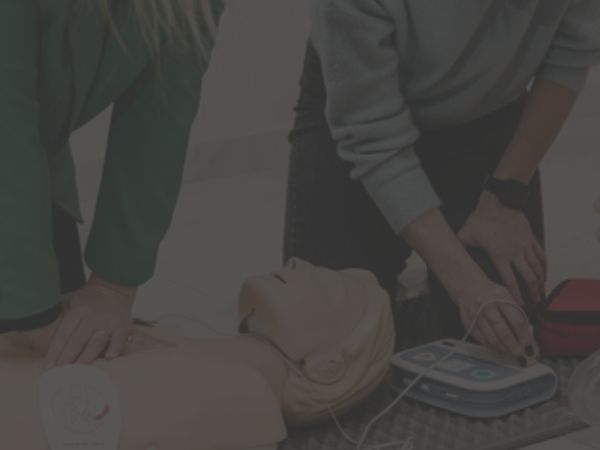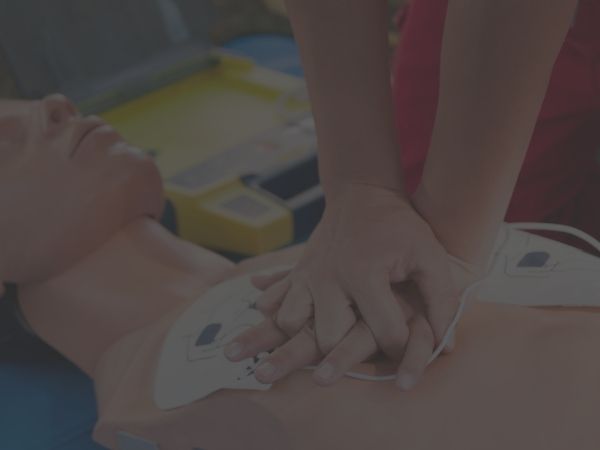Your cart is currently empty!
Top 11 Health Care Careers Highest in Demand Right Now
THE HEALTH CARE INDUSTRY WILL NEVER CEASE TO EXIST. Even in the depths of economic anguish, the demand for more health care professionals is continuing to grow, because let’s face it, disease, injury and illness will always endure.
Improvements in medical technology and an increase in the population of Generation X has created the highest demand of health care jobs ever. According to a 2013 Health Care Report published by the Bureau of Labor Statistics, the health care industry is projected to add over 4 million jobs between 2012 and 2022.
If you are looking to start a career within the health care industry, whether you are a student or simply looking to change up your current career, here are the freshest health care careers with employers looking to hire people just like you. List and percentages found on Monster.com.
11 High Demand Health Care Jobs Right Now

#1 Veterinary Technician 41%
Who: Veterinarians in need of assistance typically hire vet techs. These are not licensed veterinarians, but have the education and skill-set to carry out the responsibilities within a veterinary facility. To become a veterinary technician, one must graduate from a vet tech program that is accredited by the Committee on Veterinary Technician Education and Activities (CVTEA) of the American Veterinary Medical Association, or other accredited association approved by the Board.
What: Vet techs have a wide range of daily duties, some of these include: observing animal behavior, prepping animals for exams, collecting test lab samples, taking X-rays, administering medication and maintaining patient records.
Where: Vet techs work in veterinary facilities alongside veterinarians.
#2 Physician Assistant 39%
Who: Like veterinarians, physicians also typically require assistance in the office. Physician’s assistants, or PAs, practice medicine on health care teams with physicians and other health care providers. To become a PA, one must complete a PA program from an institution that is accredited by the Review Commission on Education for the PA and the PA Education Association, who represent PAs. This specific education must be completed alongside basic science courses and clinical rotations.
What: PAs have a vast array of responsibilities that differ everyday. Some of these daily responsibilities include: taking medical history, conducting physical exams, teaching preventative care, writing prescriptions and assisting in surgery.
Where: PAs work in several settings such as hospitals, physician offices, nursing homes, schools and community health centers.
#3 Clinical Athletic Trainer 37%
Who: Clinical athletic trainers are the link between a patient and a medical doctor in regards to any athletic or sports related injury, treatment or rehabilitation. To become an athletic trainer, one must have completed a bachelor’s degree, BOC certificate and a current state licensure.
What: Athletic trainers also have a vast range of responsibilities that are ongoing and vary day-to-day. Some of these include: treating and rehabilitating athletic injuries, providing patient education on prevention and care, completing training documentation, providing support at athletic events or practices or working with clinical staff to develop outreach programs.
Where: Athletic trainers can work in a variety of professional settings such as schools, colleges, sports medicine clinics, emergency rooms and physician offices.
#4 Medical Assistant 34%
Who: Medical assistants work alongside physicians, like PAs, but require different educational backgrounds and have slightly different responsibilities. They are cross-trained, meaning they can work both administrative and clinical duties. Education to become a medical assistant varies between individuals and preference. Often, medical assistants either receive on-the-job training by the medical doctor he or she is assisting, or through formal training and accrediting programs.
What: Like stated above, medical assistants work both administrative and clinical duties. Some of the administrative duties include: answering telephone calls, greeting patients, scheduling appointments, handling billing and bookkeeping and updating medical records. Some of the clinical duties include: patient education, preparing patients for exams, collecting lab samples, authorizing prescription refills and taking electrocardiograms.
Where: Medical assistants work in medical labs, primary care facilities, chiropractors offices and retirement communities.
Want to learn more about medical assistants? Check out our blog and infographic: What Does it Take to be a Leading Medical Assistant?
#5 Veterinarian 33%
Who: Veterinarians are the primary medical providers for common household pets. They can also treat specialized animals, such as a reptile or farm animal vet. To be a vet you must first complete a pre-veterinary program bachelor’s degree and then attend an American Veterinary Medical Association (AVMA) accredited school to earn a Doctor of Veterinary degree.
What: Vets are the primary medical caretakers of pets. These responsibilities vary everyday, but include: examining, diagnosing and treating animals, prescribing medications, taking cell and tissue samples and performing surgery.
Where: Veterinarians can work in veterinary facilities, animal hospitals or on location if need be.
#6 Pharmacy Technician 32%
Who: Licensed pharmacists often require assistants, thus hiring pharmacy technicians. Pharmacy technicians assist pharmacists in both clinical and administrative areas. To become a pharmacy technician, there are a couple options one can take. Post-secondary education is optional, but many choose to receive an associate’s degree in a related field that is accredited by the American Society of Health-System Pharmacists (ASHP). Others choose to go straight from high school into on-the-job training, then go on to specialized training. Pharmacy technicians also need to pass a recertification exam every two years and must complete at least 20 hours of continuing education before completing the recertification exam.
What: Pharmacy technician responsibilities include: organizing and collecting patient information, distributing medication, providing drug information and offering patient education. As far as administrative duties, pharmacy technicians provide services for prescription refill requests, affix prescription labels, maintain patient profiles and prepare insurance claims.
Where: Pharmacy technicians work in hospital, retail, nursing home and chain pharmacies.
#7 Dental Hygienist 30%
Who: Dental hygienists are responsible for cleaning teeth before the dentist takes over for the remainder of the dental appointment. They require an associate’s degree in dental hygiene, which typically take about three years to complete.
What: Dental hygienist responsibilities include: cleaning teeth, examining patients for oral diseases, teaching preventative care and taking oral X-rays.
Where: Dental hygienists work in a dentist’s office.
#8 Physical Therapist 27%
Who: Physical therapists (PTs) are health care professionals who help patients with limited abilities to move and perform functional activities in their daily lives. To become a PT, one must receive a Doctor of Physical Therapy (DPT) Degree from an accredited program by the Commission on Accreditation in Physical Therapy Education (CAPTE). Prior to completion of the program, many choose to receive a bachelor’s degree or choose a program that offers freshman-entry.
What: PTs have career responsibilities that differ everyday, some of these include: developing individual treatment plans, reducing pain, restoring function, preventing disability, creating fitness programs and using treatment techniques based on the patient’s needs.
Where: PTs provide care for people in various settings, which include hospitals, private practices, home health agencies, fitness facilities, nursing homes and schools.
#9 Radiation Therapist 25%
Who: Radiation therapists treat cancer and other diseases in patients by administering radiation treatments. To become a radiation therapist, one must complete an associate’s or bachelor’s degree in radiation and then complete a 12-month certificate program.
What: Radiation therapists have many daily duties, which include: explaining treatment plans to patients, examining machines for safety, performing X-rays, operating radiation machines, monitoring patient reactions and keeping detailed records of the treatment.
Where: Radiation therapists work in hospitals, physician offices and outpatient centers.
#10 Surgical Technician 24%
Who: Surgical technicians work alongside surgeons, nurses and anesthesiologists during medical procedures. Like most health care professionals, surgical assistants are a part of a team. To become a surgical technician, one must complete a postsecondary certificate or associate’s degree program in a related field. There are also additional certifications and specializations available if desired.
What: Surgical technicians have job duties including: preparing operating rooms, disinfecting and checking equipment, preparing patients (cleaning, shaving, etc.), passing sterile surgical equipment, cutting sutures, dressing patient wounds and transporting patients back to his or her room after surgery.
Where: Surgical technicians work in hospitals, operating rooms and anywhere that surgery is performed.
#11 Registered Nurse 22.2%
Who: Registered nurses (RNs) make up a huge portion of employees in the health care industry. They are considered specialized members of the interdisciplinary medical team. There are several specializations within registered nursing. Some of the most popular choices include:
- Chief nursing officer
- Nurse anesthetist
- Critical care nurse
- Clinical nurse managerLabor and delivery nurse
To become a RN, one must complete either an Associate Degree in Nursing (AND) or a Bachelor of Science in Nursing (BSN). After this schooling, graduates must pass the NCLEX-RN, an exam that allows the student to become a practicing registered nurse.
What: RNs have a long list of responsibilities, which depend on the specialization area of work. Some of these daily responsibilities include: observing and recording patient behavior, establishing treatment plans, performing diagnostic tests, treating medical emergencies and administering medications and treatments.
Where: Nurses work in environments such as health care facilities, hospitals, physicians offices, schools and patient homes.
Are you a nursing student? Check out our latest blog post Student Nursing 101: Top 15 Free Online Resources for Nursing Students.
There you have it! There are the top 11 health care careers in highest demand right now! Which of these careers would you like to work in? Comment below!
![]()












Leave a Reply